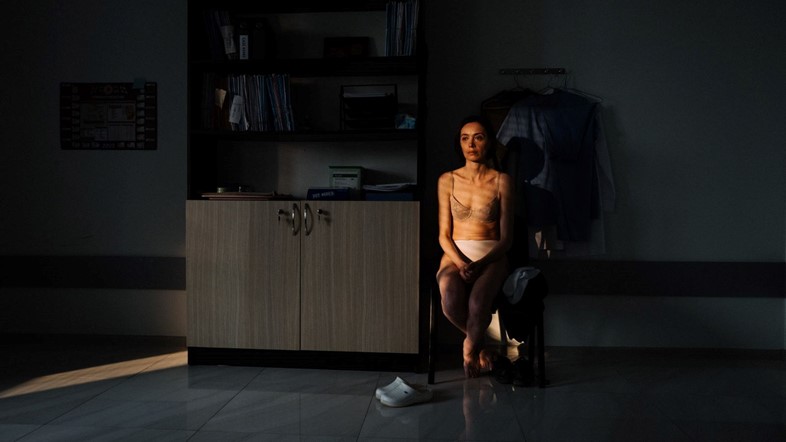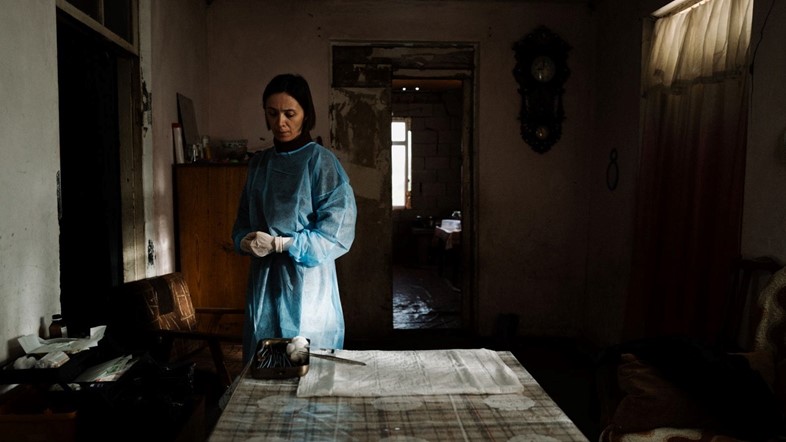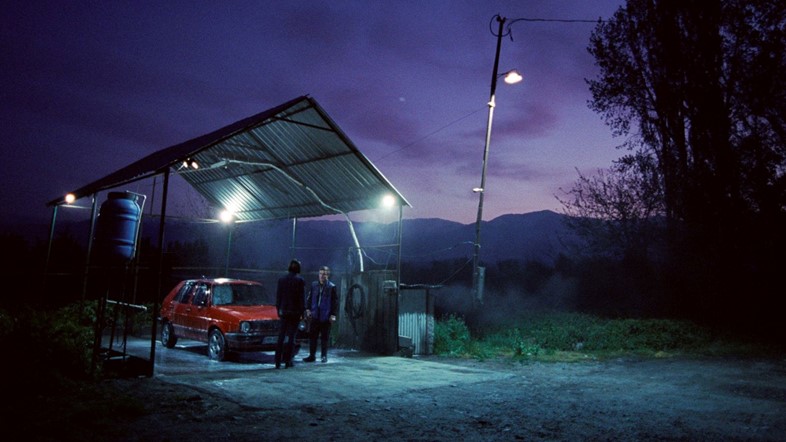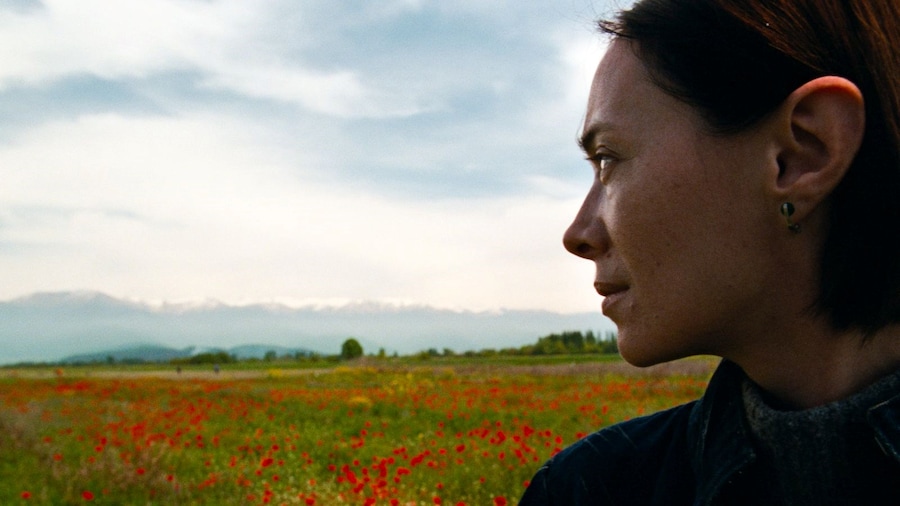One of cinema’s most exciting new voices, Dea Kulumbegashvili’s searing new film arrives at a time of mounting intolerance in her home country of Georgia
There are few weirder ways to introduce a protagonist than as an amorphic, alien version of themselves, devoid of mouth and eyes, enveloped by darkness. That’s how writer-director Dea Kulumbegashvili chooses to first represent Nina (a chilling Ia Sukhitashvili) in her barbed, brooding abortion drama April, which floored critics on its premiere at Venice Film Festival last autumn.
Likened by commentators to a hag, a witch and even a foetus, the abject entity emerged out of Kulumbegashvili’s intensive research inside a maternity ward in her hometown of Lagodekhi, Georgia, as a “way out mentally and emotionally”. “There were moments when I was overwhelmed by empathy, and it was almost impossible to sustain,” the director explains. She raises an eyebrow at the hag and witch comparisons: “It’s more something not human any more, but we don’t know what it is yet… [It’s] lost beyond the world we live in.”
Scenes with the creaturely alter ego, embodied by dancer Hannah Sheperd beneath the costume, offer Nina respite from her life as a tormented obstetrician. On top of her day job, Nina risks her career to give local women contraceptives and abortions, which are technically legal but practically taboo in Georgia. Between shifts, Nina ventures to backwater villages to carry out abortions and, by night, alleviates her loneliness by seeking out risky encounters with men.
Motherhood was a topic underpinning Kulumbegashvili’s debut, Beginning, a frosty domestic thriller revolving around a family of Jehovah’s Witnesses in the same rural Georgian community. The film, which also starred Sukhitashvili, was the first instalment in what the filmmaker hoped would be a trilogy set in the region. She now fears she can’t complete it due to the political situation in Georgia, where LGBTQ+ rights are under siege, the word ‘gender’ has been removed from legislation and single women’s rights to adoption are being questioned. But while filming April, she was pregnant.

When asked about the throughline between motherhood and violence across her two features to date, Kulumbegashvili responds: “Now that I have my own child, I understand that being a mother really shows you your own limitations, but at the same time, your own possibilities in all ways and forms” – whether that be murder in Beginning, or, in April, complicity in covering up abuse. Meanwhile, on Zoom, we are joined by Kulumbegashvili’s slightly restless toddler, born just before post-production.
The inherent brutality of motherhood is summed up by the image of a real birth confronting us in first few minutes of April. Captured in a stark aerial shot, the scene was filmed at the urging of expectant mothers Kulumbegashvili met during her research for the project. All were given a contract and had their first year of childcare paid for, regardless of who wound up on screen. “It was a very modest payment for their generosity, because what they opened up for us is something which is priceless,” says Kulumbegashvili.
Stripping birth of the mythologisation prevalent in Christian depictions, the scene is decidedly unsanitised. “In fiction cinema, we’re used to thinking that everything that happens in front of the camera is happening for us. Here, we needed to be almost invisible, not in the way of doctors,” recalls Kulumbegashvili. “When you go to film a child being born, you understand you need to step back, because you’re not the main element of what’s going on.”

A darker strand of the story also stemmed from Kulumbegashvili’s time in hospital. A woman arrived in critical condition as a result of domestic violence, leaving behind three young children when she died. “I knew all the participants of this story,” says Kulumbegashvili, tearfully. “Femicide [here] is a very frequent occurrence, especially in the regions and villages which are remote. Sadly, I would say, the Georgian government does not do anything to change the mentality or help prevent those cases.”
April was in part an attempt to lay bare all the messier, more morbid and underacknowledged trappings of womanhood, culminating in a striking abortion scene taking place on a kitchen table covered with a plastic sheet. (By this point in our conversation, Kulumbegashvili’s son has vanished off-camera, but occasionally tries to get his mother’s attention.) “When I was hearing stories [about abortions], I always had this feeling that it was a sacred, almost ritualistic process,” says Kulumbegashvili. Steered by an unwavering Sukhitashvili, it’s another moment in the film which blurs fact and fiction. “I wanted that procedure to be as long as it would really be. It was all done with precise instructions from the doctors there with us on set. We were practising it a lot, so it would become very mechanical.”

An unnerving visceral quality underlies April; not only in its unflinching images of birth and abortion, which border on body horror, but in its roiling, stormy landscapes. Yet with its minimal dialogue and understated acting, the drama is played down rather than up. “I don’t want any image to have shock value,” the filmmaker emphasises – though she knows that in Georgia, where April still doesn’t have distribution, a sense of scandal is circling it. The character of Nina is inspired by Kulumbegashvili’s grandmother – an educator during the Soviet era – but, after her mother’s dismayed reaction to the film, the director has decided to not share or discuss it with the rest of her family. “My own mother feels this need to tell me that what [April] shows is not true,” Kulumbegashvili explains. “If I show the film [in Georgia], the dialogue would go in the wrong direction. It would be mostly about condemning [it]: ‘How dare we talk this way about the subject?’”
Despite its violent interludes, the filmmaking style behind April is deceptively gentle, with Kulumbegashvili even deliberately cutting out some of the gruesomeness. “I would rather have the possibility, or create the possibility, to get immersed in a moment,” she says. “I’m always curious in questioning: do images that I’ve shown on screen correspond or get into dialogue with things we already know, things we have already seen, or are going to see in the future? I don’t think that watching a film is an experience that happens in one or two hours and then is forgotten. It’s part of [cinema’s] ongoing dialogue which started long ago and is going into the future at the same time.”
April is out in UK cinemas now.
